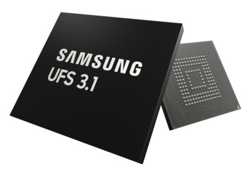Mass Production of Samsung Automotive UFS 3.1 Up to 512GB Memory Solution with Lowest Power Consumption
Satisfies requirements of AEC-Q100 Grade2, temperature from -40°C to 105°C.
This is a Press Release edited by StorageNewsletter.com on July 20, 2023 at 2:02 pmSamsung Electronics Co. Ltd. initiated mass production of its automotive Universal Flash Storage (UFS) 3.1 memory solution optimized for in-vehicle infotainment (IVI) systems.
This solution offers the industry’s lowest energy consumption, enabling car manufacturers to provide the best mobility experience for consumers.
The UFS 3.1 lineup will come in 128, 256 and 512GB variants. The enhanced lineup allows more efficient battery life management to future automotive applications such as electric or autonomous vehicles. The 256GB model, for instance, has reduced its energy consumption by about 33% compared to the previous-gen product. The 256GB model also provides a sequential write speed of 700MB/s and a sequential read speed of 2,000MB/s.
“Samsung’s new UFS 3.1 solution addresses a wide range of customer needs for optimized IVI systems while pushing forward with next-generation memory trends that require higher ESG standards,” said Hyunduk Cho, VP, memory product planning team. “We aim to expand our presence in the automotive semiconductor market, following the introduction of our UFS 3.1 solution for advanced driver assistance systems (ADAS).”
The automotive UFS 3.1 solution satisfies the requirements of AEC-Q100 Grade2, a semiconductor quality standard for vehicles which guarantees stable performance in a range of temperatures from -40°C to 105°C.
The company plans to supply its UFS 3.1 products to global automakers and parts manufacturers by the end of this year.
As firm continues to strengthen its automotive memory solution portfolio, the company received an ASPICE Level 2 certification from customers in April, 2023, with its ADAS-oriented UFS 3.1 product. It obtained ASPICE Level 2 certification from C&BIS, a renowned automobile certification agency, with the UFS 3.1 product for ADAS supplied to customers and received verification for the high stability required in automotive semiconductors this month.
Since the company first started its automotive memory business in 2015, it has continued to grow rapidly. In 2017, the firm introduced the industry’s first UFS for vehicles and has since been providing various memory solutions such as AutoSSD, Auto LPDDR5X and Auto GDDR6. As storage and computational demands on the automotive sector continue to grow, it aims to deliver optimized memory solutions for automotive customers and reinforce its development and quality enhancement efforts to accelerate its leadership.















 Subscribe to our free daily newsletter
Subscribe to our free daily newsletter

